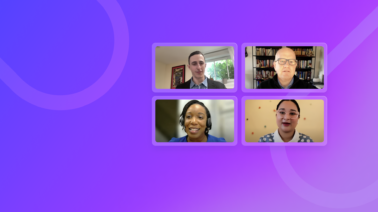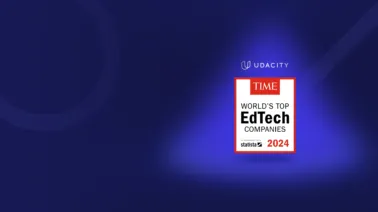
Like many of us, Robert Pullan reached a level of success in his life, and then realized he wasn’t satisfied with the direction his career had taken. He’d served five years in the British military after high school, but life as a vehicle mechanic wasn’t where his ambitions lay. Robert had held an interest in computers and programming since before he enlisted, but after leaving the military, his first experiences working “in tech” meant working as an IT technician, and that didn’t inspire him. What the experience did do, was motivate Robert to start researching the life of a developer; through that research, he came to realize there WERE ways for him to forge a career in programming.
Robert started an intense effort to learn new skills and gain valuable experience. Today, he’s a graduate of two Nanodegree programs, and he’s also on course to graduate with a Bachelor’s degree in mathematics from a UK university. Best of all, he’s landed an exciting new job as a junior software developer!
We spoke with Robert about his journey to a career as a developer.
Can you start by telling us about your professional background?
I joined the military straight after high school and served for about five years as a vehicle mechanic. At the time, I thought the army sounded like an opportunity to learn a trade, and working on vehicles seemed to suit my practical skills. But when I finished my four year minimum service, I was older, my interests had changed, and I decided I wanted to do something else. I chose to return to civilian life soon after.
It was never something I’d thought of as a career before, but I started looking into how to become a programmer, because I’d been interested in computers since childhood. However, I couldn’t see how I could do it. I’d joined the army with no qualifications, and the research I did made it sound like programming wasn’t an option open to me.
I was actually jobless for a while, and really struggled to find a role that interested me. But I needed income to help support my wife and myself, so I eventually accepted a position at a hardware retail company. It was a practical decision; I was just working as an IT technician to fix customers’ computers. It was okay, but I’d never actually wanted to become an IT technician. Nevertheless, I realized quickly that getting credentials and learning new skills would help me retain the job and the income, so I gained multiple certifications in IT support.
I still wasn’t enjoying my work though. So in early 2014, I decided I needed to make a REAL career change, and resolved to make a concerted effort to start down the road to becoming a programmer. It was a big decision for myself and my wife. Gaining the skills and credentials I needed could take years, and could be expensive and time-consuming. But we decided to go for it as a couple. My wife decided to add to her resume too. She was just finishing the final year of her Bachelor’s, and chose to continue studying with a part-time Master’s degree. So we really encouraged each other to make a change!
To start your journey to becoming a programmer, you decided to enroll in an undergraduate degree program. You also started taking a number of free online programs. What was your motivation for doing both simultaneously?
I’d researched the job market, and become certain that 99 percent of companies would not even look at me as a candidate for a entry-level programming role if I didn’t have any programming experience or higher education qualifications. My plan was to build my skills and my resume so that I could tick both those boxes. So I decided to enroll in a distance-learning undergraduate degree program for the subject I found most interesting—math. By enrolling in a part-time program at the UK’s Open University, I would be able to study while still working. Simultaneously, I started looking at free online courses where I could learn the programming skills I needed to land a role as an entry-level software developer.
Can you tell us about your goals for the free online programming courses you tried?
I went in believing that by completing lots of free online courses in coding, I’d learn the programming languages and skills I needed to start developing my own projects. In all my previous practical work, that’s how I’d succeeded—by first being shown something, then going off by myself and applying what I’d learned.
I understand your experience with those free courses wasn’t quite what you’d hoped for; what actually happened?
Well, I wouldn’t describe myself as the smartest, or the most naturally creative person in the world, and when I started, I found creating applications on my own to be a really hard, stressful task, and often really demoralizing. I always came out of those free courses without feeling confident I could actually apply the new skills I learned. I’d know some of the theory, but I wouldn’t know where to start with building something independently. I finished a range of fundamental programming courses, and even earned an MTA (Microsoft Technology Associate) certification in software development, but I still really wanted—and needed—more structure to help me turn my skills into practical experience.
What did you decide to do next to keep moving towards your goal of becoming a programmer?
I was feeling really disheartened, but I didn’t want to give up. That’s when I saw an advertisement for Udacity’s Data Foundations Nanodegree program. The curriculum sounded really interesting, and the focus on mentoring and project reviews seemed to offer the kind of structure and support I felt I needed to really learn.
Did the Nanodegree program experience provide the learning path you were looking for?
When I enrolled, the difference between the online courses I’d done before and the Nanodegree program were immediately clear. I really enjoyed the project focus of the program—it meant I was building things worthy of a portfolio to show to employers. And I liked that I got direct feedback and support on the work I was doing. Studying wasn’t such a solo experience! The lessons and quizzes felt really well structured, so that I felt like I was progressively learning new skills at a comfortable pace. I was continuously testing the skills I’d just learned, and then putting them into practice to make things for myself.
That’s great! But, I’m curious how your work in the Data Foundations Nanodegree program informed your pursuit of a programming career. Can you tell us about that?
When I finished that program, I’d gained so much from that experience, and I felt really confident about my abilities. So I quickly enrolled in the Intro to Programming Nanodegree program! I particularly loved the practical focus again, and I was really hopeful that the projects I built would help show employers my capabilities and potential.
 Building your own projects and creating a portfolio proved to be a great move for you. I understand you’ve got some great news to share?
Building your own projects and creating a portfolio proved to be a great move for you. I understand you’ve got some great news to share?
It does! It’s four years since I started on this path, but I’ve now achieved the first step in my plan. I recently had an interview for a Junior Software Developer role at a software company, and I got the job!
Congratulations! Do you feel like your Udacity experience made a difference for your interview outcome?
The hiring manager told me that the key phrase they picked up on during my interview was “In my own time I built…” That’s what I kept saying everytime I started talking about my Udacity projects. It proved to them that I had the passion, self-motivation, and dedication to become a developer. They were really impressed with my portfolio—especially the website I’d built, which was a project from my Nanodegree program. I’m now working as a developer, using MVC, C#, HTML, CSS, JavaScript, SQL, and Knockout.js in my work.
Do you have any advice for others who might be interested in pursuing the kind of career change you have?
It’s important to have a goal, stay positive about achieving it, and keep moving forwards. There were definitely moments when I really struggled to stay motivated with my studies and my career plans. I still remember feeling really demoralized after not hearing back from my applications—I think I applied to nearly 50 places that I didn’t get a response from! There were even times when I actually spoke to recruiters who were positive my past experience in IT would land me an interview, but then I still never got any further. Before I finished my Nanodegree programs, I think the lack of a portfolio with finished projects really prevented me from getting a foot in the door. But it’s important to just keep going.
“I landed the interview with my current employer because I’d kept applying, and kept building my portfolio, and I got the job because I had the skills they were looking for.”
You’ve mentioned structure a few times; how important is structure to learning and career success?
The structure provided by Udacity’s projects was one of the key reasons I succeeded. The way I learn best is with some guidance and framework to help me gain confidence and experience. It helped me finish building challenging projects, and meant I could later prove my ability to employers.
Did the fact that your wife was also learning during this same period have an impact on your efforts?
My wife was a major inspiration to complete the program. Her dedication to her own studies really kept me focused on completing each project and finishing the Nanodegree program.
This is all such great news, but I can’t help but ask, what are you going to do next?
I’m still studying for my degree, and I’m also thinking about completing a Master’s degree in Software Engineering when I graduate. And I want to gain enough experience to have the “Junior” removed from my title at work. Then I’ll feel like I’ve become an established software developer. I’m also planning to look into the Artificial Intelligence or iOS Developer Nanodegree programs next year, when I’ve worked as a developer for at least twelve months. My education now will never stop!
˜
That’s a great attitude Robert! It’s really inspiring to see how you’ve stayed so dedicated to making your career transition happen. You’ve overcome self-doubt and the frustrations of job-hunting to land a job that’s a major step forward on your dream career path. Congratulations!



